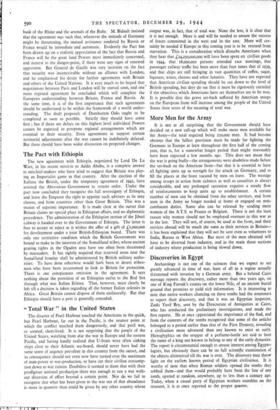Total War" in the United States The disaster of Pearl
Harbour touched the Americans to the quick, but Pearl Harbour, far out in the Pacific, is the nearest point at which the conflict touched them dangerously, and that peril was, or seemed, short-lived. It is not surprising that the people of the United States, watching from afar the war in Europe and the eastern Pacific, and having hardly realised that U-boats were often sinking ships close to their Atlantic sea-board, should never have had the same sense of urgency prevalent in this country from the outset, and in consequence should not even now have turned over the maximum of man-power to war-production, or have cut their civilian consunip- tion down to war rations. Doubtless it seemed to them that with their prodigious national productipn there was enough to run a war with- out diversion of effort beyond a certain point. Nor do we fail to recognise that what has been given to the war out of that abundance is more in quantity than could be given by any other country whose
output was, in fact, that of total war. None the less, it is clear that it is not enough. More is and will be needed to ensure the success of forces committed in the west and in the east. More will cer- tainly be needed if Europe in this coming year is to be rescued from starvation. This is a consideration which disturbs Americans when they hear that £24,25o,000,000 will have been spent on civilian goods in 1944, that r8,000,000 persons attended race meetings, that passenger railway traffic has been more than four times that of 1939, and that ships are still bringing in vast quantities of coffee, sugar, liqueurs, wines, cheeses and other luxuries. They have not expected that American civiliarr spending should be cut down to the level of British spending, but they do see that it must be rigorously curtailed if the objectives which Americans have set themselves are to be won. It is possible that the grave set-back suffered by American troops on the European front will increase among the people of the United States their sense of the meaning of total war.•


























 Previous page
Previous page